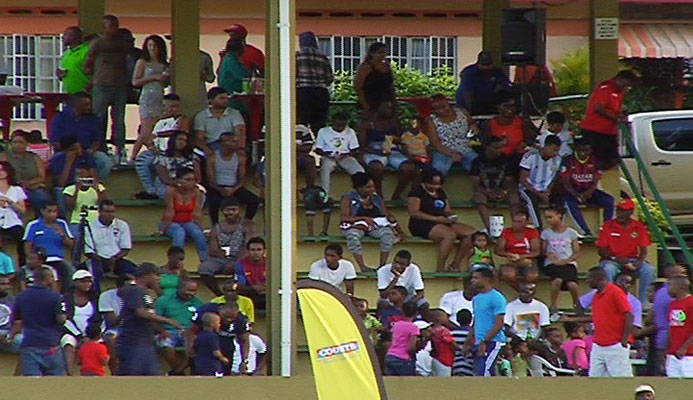“Say too much borderline, man and man fraid to walk down in ah next man vicinity,
It’s borderline, all this Satan wickedness in the poor man community,
It’s borderline, say man and man fraid to walk down in ah next man vicinity...”
Sunday gone, there were no self-imposed borders in the Park Street area of Morvant.
Local reggae artiste Mr King would have been pleased.
Having made his plaintive plea in song for unity among the masses with his “Borderline”, a smile would have broken out on King’s face had he been there to see national athletics boss Ephraim liming with his crew on Ramier Street, overlooking the Morvant Recreational ground on the western side, mere doors away from his own home, and former Strike Squad hero Hutson “Barber” Charles having a quiet look from the southern, Park Street side.
It was easy viewing.
“Doh want no badman groups
No more badman troops coming to rob and shoot...”
The T&T Pro League had come to Morvant and the people turned out to see the show.
For the first time in their 14-year involvement in the League, Morvant Caledonia United—the former Caledonia AIA—were playing a competitive game on home turf in front of their own people.
“This is long overdue. I think the community needs it, the support is so important to our whole development,” Jamaal Shabazz tells me.
Taking a head count is difficult but the small, yellow, refurbished main stand is just about full, as are two smaller sections snuggled in between the trees on the Ramier Street side, plus those on the road.
Shabazz has been one of those who has nurtured the Morvant Caledonia baby from birth way back in 1979 to the present day. So for him, Sunday was like graduation day for his “child”.
Now, taking a relative back seat as technical director/part owner to coach Rajesh Latchoo, Shabazz drinks in the scene from an appropriate distance. The round concrete seating area on the knoll upon which the main stand also sits gives him appropriate distance from both public and players, and time for reflection; quiet excitement.
“The notice was two days but it was buzzing,” he says of the community reaction to news of the match against neighbouring San Juan Jabloteh. “In my street people were excited,” he begins to say, his train of thought interrupted by Jabloteh’s Willis Plaza who shoots the visitors into the lead after only two minutes.
Recovering from that shock, he continues: “One of the things we have to check is the borderline situation with all the different factions and so far, the response of the different factions has been encouraging; everybody wants to see football come back in the community.
“Go tell the little school youth we no want no delinquent juvenile
Badness outta style!
And all the rude boy with the screw face, ah full time dem put on a smile
Badness outta style!”
The only “badness” taking place on Sunday was Jabloteh’s refusal to be compliant visitors.
By half time, they had the game virtually won at 3-1. But there hardly seemed any discontent in the half-time chatter.
“Morvant, allyuh team down, do something!” House announcer Wayne Cunningham tries to urge on the crowd in the second period. But silence is the only response.
It was a curious game; curious in the sense that the Morvant team and the Morvant crowd seemed to be strangers to each other; the spectators curious, rather than passionate observers of the action although 14 men on the Caledonia roster actually come from the community.
“Symbolic” was one word Trinidad and Tobago Olympic Committee president used to describe the occasion.
Dressed in white printed T-shirt and blue jeans, he blended easily into the crowd, and as a former club chairman, the Morvant Caledonia project is one in which he has special interest.
“While as you could tell everything is not as maybe it should be, in the sense of dressing room facilities, etc, I think that the initiative to move it forward nonetheless is one that is important. This is what we have to aim for if we want to generate not only success for the Pro League but sports on the whole. We have to take sports back to the communities. Too much of what is happening in sports is from the top down and not the bottom up.”
Lewis was right about the facilities. There is much work to do still. The soggy ground, struggling to absorb the rains of earlier in the day, did not encourage slick passing, while the teams had to be content with dressing and having their talks in tents set up on the eastern side.
Shabazz would like to see an artificial turf laid down to accommodate the volume of activity the ground is used for, and better lighting installed so that matches could be played on Friday and Saturday nights.
Both Lewis and Shabazz were seeing way beyond Sunday, and the next match in early November when the Defence Force will come calling.
They were seeing days when the area’s nuts and corn soup men, the hot dog lady, the sno cone man and the nearby parlour people could earn regular bread from Caledonia matches; when the club could do a thriving business selling replica shirts and souvenirs, and collect rental fees for advertising space sold to corporate T&T. They were seeing days and nights when Morvant could live off their team and their team could live off their people. They were getting visions of a new sports culture in Trinidad and Tobago where entities like the Pro League are powered, not largely by government but by its own people.
Getting to those days will be as challenging as stopping the run of red in the green hills.
But as Mr King’s late calypsonian father King Austin would have said, Sunday in Morvant was about progress.

